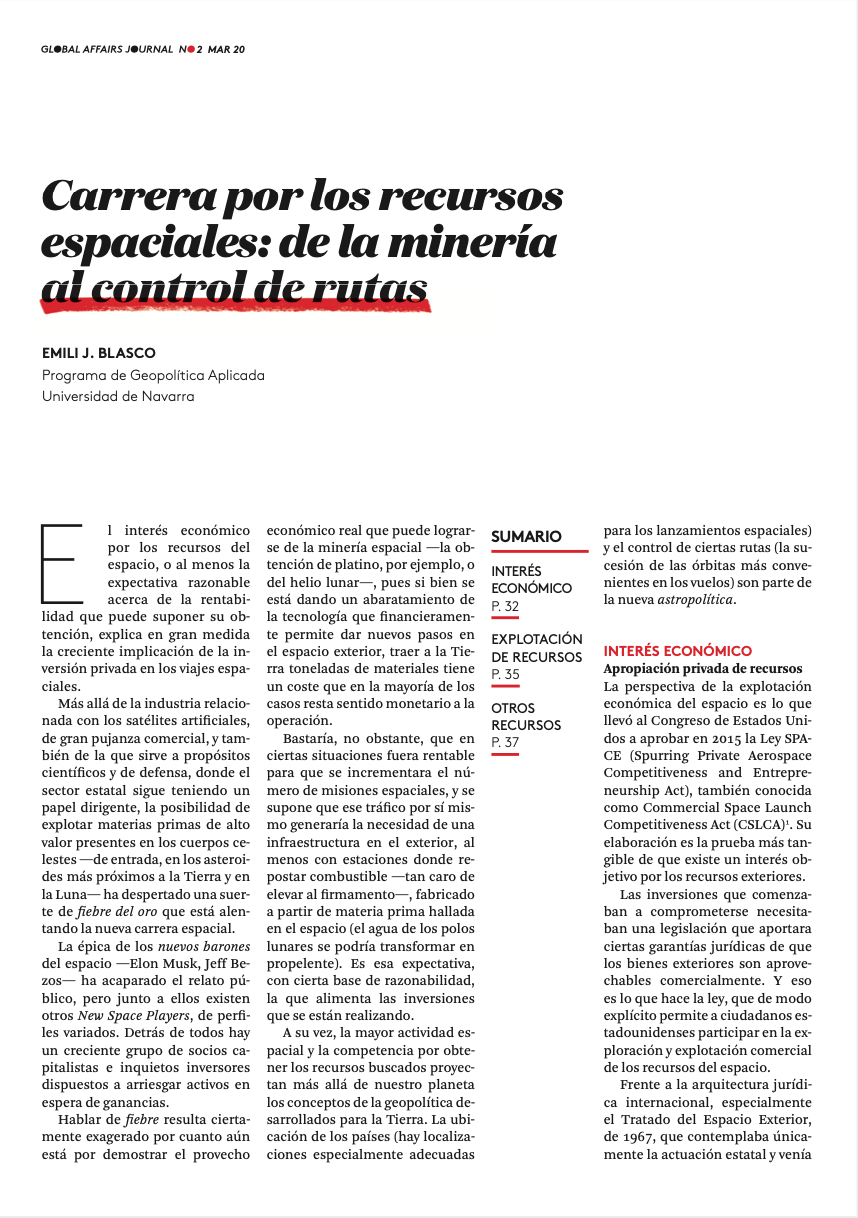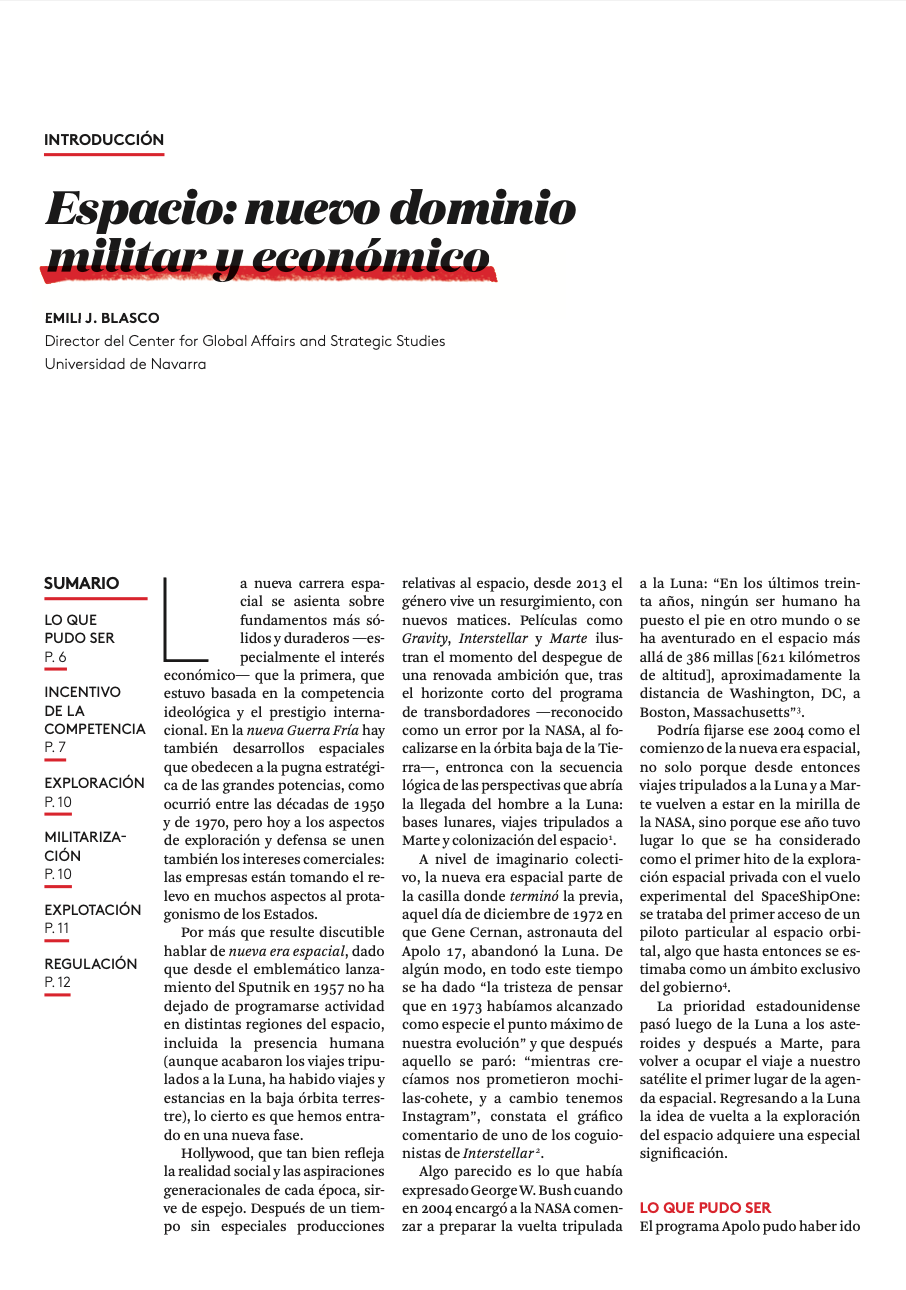Ruta de navegación
Menú de navegación
Blogs
Entries with label space assets .
![proposal of a lunar base for obtaining helium, taken from ExplainingTheFuture.com [Christopher Barnatt]. proposal of a lunar base for obtaining helium, taken from ExplainingTheFuture.com [Christopher Barnatt].](/documents/10174/16849987/gaj-foto-3.jpg)
▲ proposal of a lunar base for obtaining helium, taken from ExplainingTheFuture.com [Christopher Barnatt].
GLOBAL AFFAIRS JOURNAL / Emili J. Blasco
 [8-page document. downloadin PDF]
[8-page document. downloadin PDF]
INTRODUCTION
The economic interest in space resources, or at least the reasonable expectation of the profitability of obtaining them, goes a long way to explaining the growing involvement of private investment in space travel.
Beyond the commercially strong artificial satellite industry, as well as those serving scientific and defence purposes, where the state sector continues to play a leading role, the possibility of exploiting high-value raw materials present on celestial bodies - from entrance, on the closest asteroids to the Earth and on the Moon - has awakened a kind of gold rush that is fuelling the new space degree program .
The epic of the new space barons - Elon Musk, Jeff Bezos - has captured the public narrative, but alongside them there are other New Space Players, with varied profiles. Behind them all is a growing group of equity partners and restless investors willing to risk assets in the hope of profit.
To talk of space mining fever is certainly exaggerated, as the real economic benefit to be gained from space mining - obtaining platinum, for example, or lunar helium - has yet to be demonstrated. While the technology is becoming cheaper, financially enabling new steps into outer space, bringing tons of materials back to Earth has a cost that in most cases makes the operation less financially meaningful.
It would be enough, however, that in certain situations it would be profitable to increase the number of space missions issue , and it is assumed that this traffic in itself would generate the need for an infrastructure abroad, at least with stations to refuel fuel - so expensive to lift into the sky - manufactured from subject raw materials found in space (the water at the lunar poles could be transformed into propellant). It is this expectation, with some basis in reasonableness, that is fuelling the investments being made.
In turn, increased space activity and the skill to obtain the resources sought project beyond our planet the concepts of geopolitics developed for Earth. The location of countries (there are particularly suitable locations for space launches) and the control of certain routes (the succession of the most convenient flight orbits) are part of the new astro-politics.
![Scene about anchoring on an asteroid to develop mining activity, from ExplainingTheFuture.com [Christopher Barnatt]. Scene about anchoring on an asteroid to develop mining activity, from ExplainingTheFuture.com [Christopher Barnatt].](/documents/10174/16849987/gaj-foto-0.jpg)
Scene about anchoring on an asteroid to develop mining activity, from ExplainingTheFuture.com [Christopher Barnatt].
GLOBAL AFFAIRS JOURNAL / Emili J. Blasco
 [8-page document. downloadin PDF]
[8-page document. downloadin PDF]
INTRODUCTION
The new space degree program is based on more solid and lasting foundations - especially economic interest - than the first one, which was based on ideological skill and international prestige. In the new Cold War there are also space developments that obey the strategic struggle of the great powers, as was the case between the 1950s and 1970s, but today the aspects of exploration and defence are joined by commercial interests: companies are taking over from states in many respects.
However debatable it may be to speak of a new space age, given that since the emblematic launch of Sputnik in 1957, there has been no end to scheduled activity in different regions of space, including human presence (although manned trips to the Moon have ended, there have been trips and stays in Earth's orbit leave ), the fact is that we have entered a new phase.
Hollywood, which so well reflects the social reality and generational aspirations of the times, serves as a mirror. After a time without special space-related productions, since 2013 the genre is experiencing a resurgence, with new nuances. Films such as Gravity, Interstellar and Mars illustrate the moment of take-off of a renewed ambition which, after the short horizon of the shuttle programme - acknowledged as a mistake by NASA, as it focused on the Earth's orbit leave -, is linked to the logical sequence of perspectives opened up by man's arrival on the Moon: instructions lunar, manned trips to Mars and the colonisation of space.
At the level of the collective imagination, the new space age starts from the square where the previous one "ended", that day in December 1972 when Gene Cernan, Apollo 17 astronaut, left the moon. Somehow, in all this time there has been "the sadness of thinking that in 1973 we had reached the peak of our evolution as a species" and that afterwards it stopped: "while we were growing up we were promised rocket backpacks, and in exchange we got Instagram", notes the graphic commentary of one of the co-writers of Interstellar.
Something similar is what George W. Bush had expressed when in 2004 he commissioned NASA to start preparing for man's return to the moon: "In the last thirty years, no human being has set foot on another world or ventured into space beyond 386 miles [621 kilometres in altitude], roughly the distance from Washington, DC, to Boston, Massachusetts".
The year 2004 could be seen as the beginning of the new space age, not only because manned trips to the Moon and Mars are now back in NASA's sights, but also because it was the first milestone in private space exploration with the experimental flight of SpaceShipOne: it was the first private pilot's access to orbital space, something that until then had been considered the exclusive domain of the government.
The American priority then shifted from the Moon to some of the asteroids and then to Mars, with the journey to our satellite once again taking first place on the diary space website. By returning to the Moon, the idea of a "return" to space exploration takes on a special significance.
